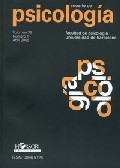Incremental validity of Emotional Intelligence Perceived in predicting well-being
Keywords:
Inteligencia Emocional Percibida, bienestar subjetivo, optimismo/pesimismo disposicional, afecto positivo y negativo, Perceived Emotional Intelligence, subjective well-being, dispositional optimism/pessimism, positive and negative affectAbstract
The aim of the present study was to assess the relationship between Perceived Emotional Intelligence (PEI) as measured by the Trait Meta-Mood Scale (TMMS), Subjective Well-Being (SWB), and dispositional optimism/pessimism. In addition, we assessed whether PEI can be considered an adequate predictor of the SWB. Participants were 518 adults, 434 males and 84 females who anonymously completed measures of satisfaction with life, positive and negative affect, perceived emotional intelligence, and dispositional optimism/pessimism. The Johnson’s method was used for estimating the relative weight of predictor variables in multiple regression. Our results support that two dimensions of PEI (Clarity and Repair) are good predictors of SWB, whereas the third dimension, Emotional Attention, seems not adequate as a predictorDownloads
Published
2012-02-10
Issue
Section
Articles
License
The authors who publish in this journal agree to the following terms:
Authors transfer to the publisher all copyright for the full term of protection and for all the world.
The authors can post a copy of their articles in accordance with the policy of free access to the journal.


